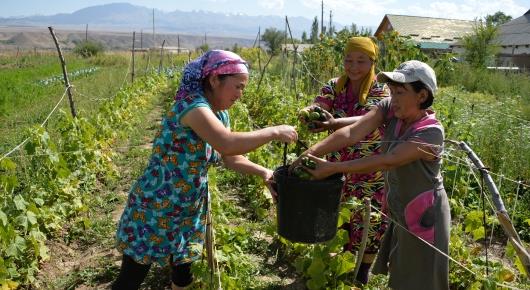Rural women in Kyrgyzstan receive assistance from Swedish funds

A programme that helps rural women in Kyrgyzstan gain access to new economic opportunities has received significant financial support from the Swedish government.
The USD 5 million contribution from the Swedish International Development Cooperation Agency (SIDA) will help expand the the Joint Programme on Accelerating Progress towards the Economic Empowerment of Rural Women in Kyrgyzstan and six other pilot countries – Ethiopia, Guatemala, Liberia, Nepal, Niger and Rwanda.
Since its inception in 2014, the programme’s aim has been to enhance the productive potential of rural women by improving their access to and control over resources, services and opportunities. It also works to enable rural women to strengthen their voices in their households and communities, and it supports the creation of a policy environment that enables the economic empowerment of rural women.
More than 64 percent of Kyrgyz women live in rural areas. They are central to rural development and to the national economy in Kyrgyzstan.They account for a significant proportion of the agricultural labor force, play a key role in food production – especially in subsistence farming – and perform most of the unpaid care work in rural areas.
However, fewer than 18 percent of Kyrgyz women head their own farms, and many rural women and girls have restricted access to productive resources such as land, agricultural inputs, finance and credit, extension services, and technology. This limits their productivity, and in turn the efficiency of the agricultural sector.
That’s why this programme targets rural women, especially those who are the most vulnerable, unemployed and without opportunities to earn an income from agricultural activities.
A collaborative exercise with tangible results
The programme is a collaboration of four participating agencies: FAO, the International Fund for Agricultural Development, the World Food Programme, and UN Women. These organizations work together to provide a package of carefully coordinated interventions targeting the same beneficiaries. The programme trains rural women in leadership skills; provides them with food assistance; prepares them (and men) to plan for livelihoods, workload distribution, and visioning; provides them with the tools of their new activities – plastic greenhouses, vegetable seeds and fertilizers – and helps them acquire new agricultural skills and technology.
One overall benefit of the programme is that through enhancing rural women’s agricultural skills, it is helping rural communities overcome stereotypes about women’s agricultural management skills. It also helps rural women advance their social status, enabling them to influence policy decisions and transform power relations at family, community and policy levels.
In Kyrgyzstan, the joint programme has nearly 3 000 direct beneficiaries: 2 710 women and 21 men. Indirectly, the program has helped nearly 30 000 people – 14 179 women and 13 559 men – in the country.
The programme has established 73 community funds that operate like revolving rural microfinance banks, through which KGS 1.5 million (roughly USD 21 900) has been saved. The programme also has created 379 women’s groups in 45 Kyrgyz villages. With their own funds and with money from local governments, community members and other partners, rural women have begun 146 business initiatives, including the opening of mini production units in villages for food, clothes, souvenirs, seedlings and more.
By the end of 2017, a dozen joint social initiatives had been completed with the help of the programme, including efforts to improve drinking water and electricity supplies, reconstruct roads, renovate child care facilities and improve information technology in rural areas.
The agricultural productivity of women participating in the programme has increased by 32.2 percent in 2017 , raising the average household income by USD 488 through the growing of vegetables on even small plots (0.06 hectares) of land. The dietary status of poor families has improved, and the number of undernourished people has been reduced by 88 percent among the households participating in the programme.
26 March 2018, Bishkek, Kyrgyzstan
